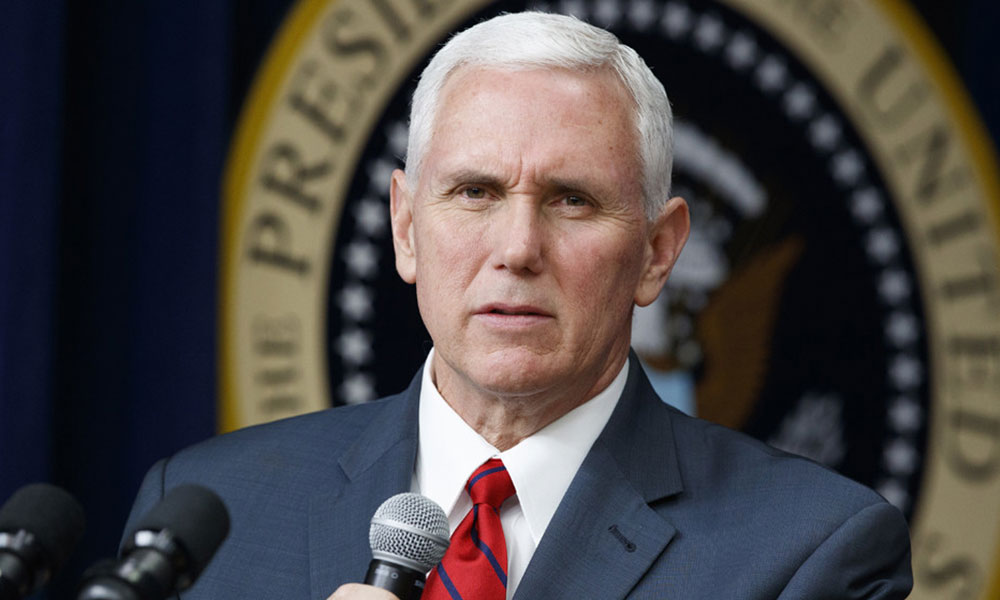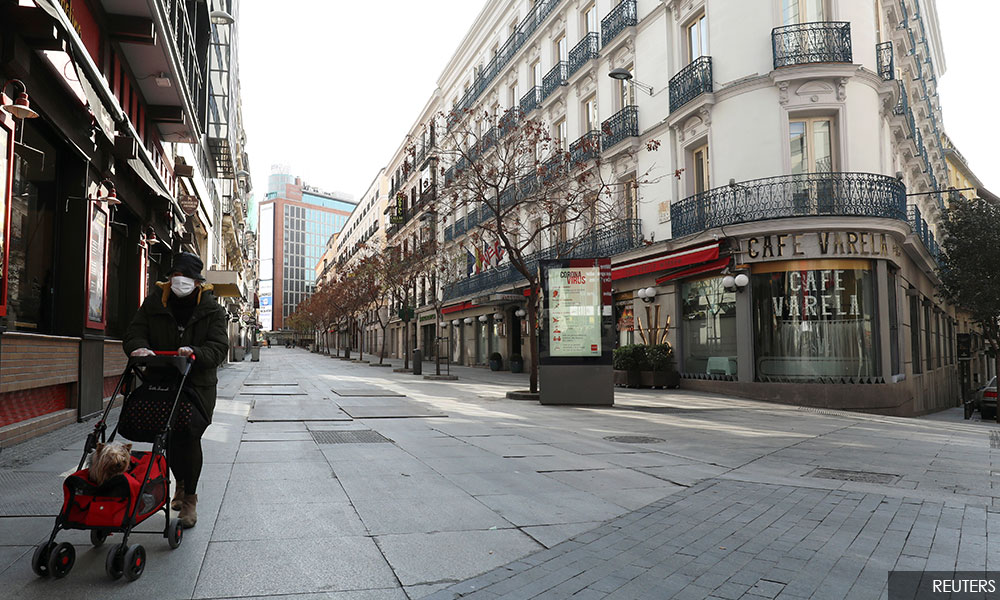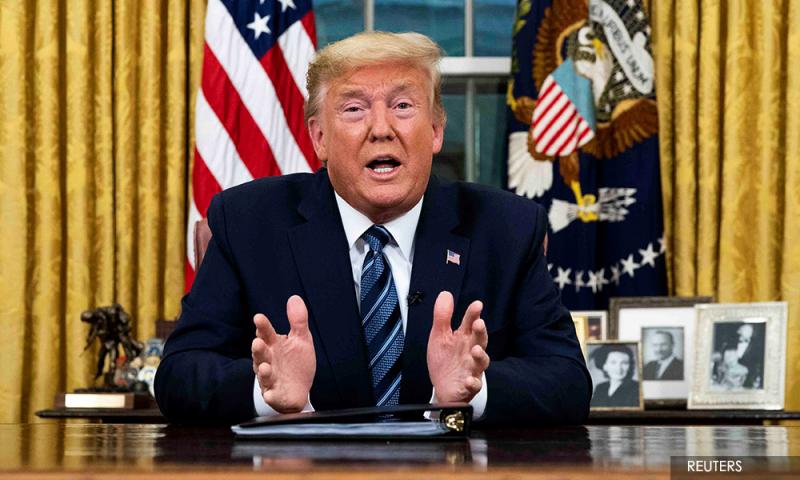Trump 'going big' with US$1 trillion stimulus as US coronavirus deaths top 100
CORONAVIRUS | The Trump administration on Tuesday pursued a US$1 trillion (RM4.36 trillion) stimulus package that could deliver $1,000 cheques to Americans within two weeks to buttress an economy hit by coronavirus, while New York said it might order its residents to stay home.
With the number of reported US cases of the respiratory illness surging past 6,000 and deaths at 104, millions of Americans hunkered down at home instead of commuting to work or school. Major cities escalated "social distancing" policies by closing schools, bars, restaurants and theatres to fight the spread of the virus.
New York Mayor Bill de Blasio said he would decide within two days whether to order the 8.5 million residents of the most populous US city to "shelter in place". The move would largely confine people to their homes but probably allow them to make necessary trips to the grocery or pharmacy.
"It's a very, very difficult decision," de Blasio said. "We've never been here before. I have never heard of anything like this in the history of New York City."
Illinois and Kentucky recorded their first coronavirus deaths, and authorities said 22 people had been infected at a nursing home in suburban Chicago.
In Washington state, where 50 people have died, Governor Jay Inslee signed legislation approving US$200 million (RM871.54 million) for homeless aid and other measures to stop the spread of the virus. In Georgia, Governor Brian Kemp signed off on US$100 million. Kansas shuttered schools through the end of the academic year.
In New Jersey, Governor Phil Murphy closed amusement parks and indoor shopping malls as a record number of unemployment applications crashed state computer systems.
In Minnesota, the Mall of America, the nation's largest enclosed shopping centre, said it would close through the end of the month. Sheriff's deputies in Los Angeles were ordered to write more tickets and make fewer arrests, to keep jail crowding to a minimum.
Less than a week after the NBA suspended its season, star player Kevin Durant tested positive for the virus, the Athletic reported.

Vice-President Mike Pence (above) said the White House may have the US military establish field hospitals in virus hot zones if requested by state governors, or use the Army Corps of Engineers to add capacity to existing hospitals.
New York, Washington state and California have the most confirmed cases of the highly contagious respiratory illness.
President Donald Trump said progress was being made against the fast-spreading pathogen and predicted the US economy would "come roaring back" when it slows.
"It's going to pop," said Trump, who is seeking re-election on Nov 3.
The Republican president's tone on the coronavirus pandemic has changed sharply in the last few days. After initially playing down the threat and focusing on the stock market, his administration has begun pushing for urgent action to stem the disease's economic and human toll.
His administration sought more than US$1 trillion for a stimulus package, including $50 billion for hard-hit airlines facing bankruptcy.
"We're going big," Trump said.
The Trump administration is also considering a plan to send cheques to individual Americans of US$1,000 to help them weather the crisis, though details remain unclear.
High earners might not qualify for payments, which could be sent within the next two weeks, Treasury Secretary Steven Mnuchin said.
Senate Republican Leader Mitch McConnell said his chamber would this week pass a multibillion-dollar emergency spending bill cleared by the House of Representatives on Saturday, despite concerns from some Republicans.
He said he told them to "gag and vote for it anyway".
McConnell said the Senate would not leave town until it passes a follow-up package.
The House bill would provide free coronavirus testing, establish paid sick leave for most workers and expand unemployment compensation.
US stocks jumped on Tuesday, a day after their steepest declines since the 1987 crash, as the Federal Reserve took further steps to boost liquidity. The benchmark S&P 500 closed up six percent. Mnuchin said the government may shorten trading hours if necessary.
Spain unveils 200 billion euros coronavirus package
Spain announced a 200 billion euros (RM958.58 billion) package on Tuesday to help companies and protect workers and other vulnerable groups affected by the spiralling coronavirus crisis.
Police carried out checks at borders with France and Portugal, turning back foreigners attempting to enter Spain as part of strict measures to stem the spread of the coronavirus in Europe's second-worst-hit country.

More than 20 inmates clambered onto the roof of a migrant detention centre in Madrid in protest against the poor conditions inside, which they said were facilitating the spread of coronavirus. Some inmates had symptoms of the virus and isolation measures were insufficient, according to a letter shared on social media. Firefighters escorted the protesters back down without incident.
Half of the economic assistance measures, which are worth 20 percent of Spain's output, are state-backed credit guarantees for companies, and the rest include loans and aid for vulnerable people.
Some 117 billion euros (RM561.3 billion) of the total will be mobilised by the state, with the rest to come from private companies.
The measures will be applied retroactively from March 14, when Spain declared a state of emergency, a government source said.
Spanish stocks rose by more than 6% after the announcement.
"These are extraordinary measures, without precedent in our country's democratic history," Prime Minister Pedro Sanchez told a news conference attended remotely by journalists.
Spain will pay benefits to workers temporarily laid off and suspend mortgage payments for those whose employment has been affected by the outbreak, among other measures.
"We want to protect employment and we want companies to know the government will help them," Sanchez said. "Nobody will be left behind."
He said the health crisis had put the brakes on the economy, but would not say whether a contraction was on the cards as in countries like France. He said the government would need a new "reconstruction budget" to deal with the aftermath of the epidemic when it subsides.
More than half of jobs in Spain are dependent on small or medium-sized companies in a country with one of the developed world's highest unemployment rates.
Fast-rising death toll
"I have a little saved up, but I have absolutely zero income at the moment," said Raquel Las Heras, who runs a booth selling lottery tickets in Albacete, in southeast Spain. "If I stay home like this, I reckon I can last about two months."
Spain's 47 million people have been under partial lockdown since Saturday night, allowed to leave their homes only to go to work, buy food or visit a pharmacy or hospital, and hundreds of thousands have been sent home temporarily from companies such as Volkswagen and Burger King.
The Defence Ministry said it would increase the number of troops deployed to police the lockdown including detachments across Madrid's network of commuter rail stations to prevent crowds from forming at rush hour.
The government reported 182 new fatalities overnight, bringing the total to 491 and making Spain the country with the world's fastest-rising death toll after Italy. The number of people infected rose to 11,178.
In response, the Health Ministry began distributing more than one million surgical masks to health workers, around half of which were donated by China. Police previously seized more than 150,000 such masks from a factory.
- Reuters
RM12.50 / month
- Unlimited access to award-winning journalism
- Comment and share your opinions on all our articles
- Gift interesting stories to your friends
- Tax deductable

 Reuters
Reuters